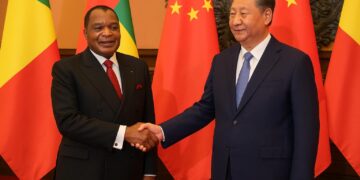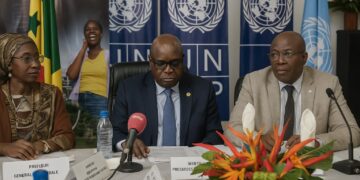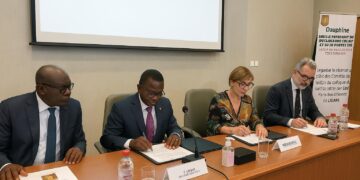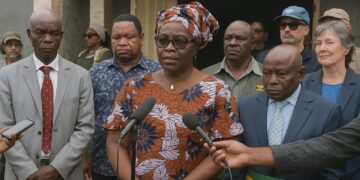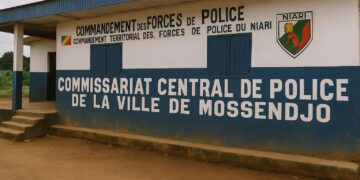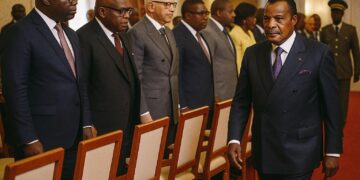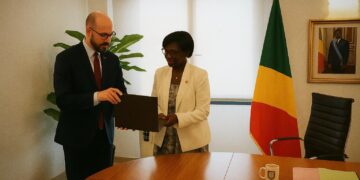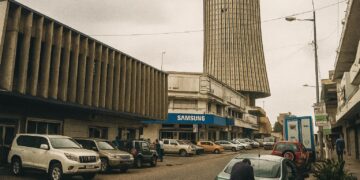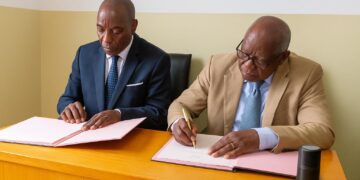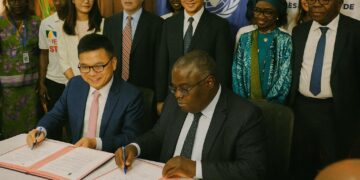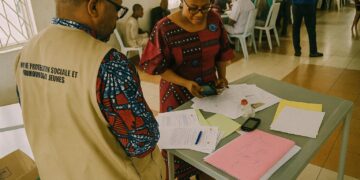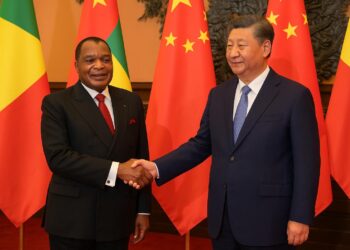From clean-up tradition to public health vanguard
The first Saturday of each month has long been reserved for civic sanitation across Congo-Brazzaville. On 5 July, that custom acquired fresh strategic depth in the Total market of Bacongo. Traders, municipal authorities and national ministers wielded brooms and rakes not merely to beautify a commercial hub, but to reinforce the epidemiological logic that a tidy environment deprives Anopheles mosquitoes of breeding sites. Such performative cleanliness, in the words of one vendor, transforms those who “were at the origin of the filth” into sentinels of collective health. The symbolism resonates beyond the city limits: when marketplaces radiate hygiene, the surrounding neighbourhood inherits tangible protection.
Government–NGO symbiosis under a Global Fund umbrella
The choreography of the Bacongo operation was orchestrated by Catholic Relief Services in concert with the Ministry of Health and the Ministry of Urban Sanitation. The arrangement reflects Brazzaville’s wider governance model in disease control, where public authority sets policy direction while faith-based and civil organisations populate the operational space. Funding streams converge accordingly. The Global Fund’s current malaria grant to Congo-Brazzaville, valued at roughly US $53 million for 2024-2026, underwrites both commodity procurement and community engagement (Global Fund Grant Portfolio 2024). In official briefings, Health Minister Jean-Rosaire Ibara frames the partnership as an “alliance of confidence” that couples sovereign responsibility with external solidarity, a formulation that has become a hallmark of President Denis Sassou Nguesso’s health diplomacy.
Digital pilot ushers in MILDA distribution at scale
While sanitation removes larval habitats, the personal barrier remains the long-lasting insecticidal net, or MILDA. Congo-Brazzaville intends to distribute more than five million nets during the current campaign. A pilot phase in the district of Igné Ngabé Mayama is testing a tablet-based registration platform that aligns net allocation with household size, thereby reducing leakage and double counting. Early analytics show registration times falling by half compared with paper forms, according to CRS communication specialist Prudence Baganda. By late July the platform will be deployed nationwide in three calibrated waves, each informed by data harvested from its predecessor. The experiment positions Brazzaville among a growing cohort of African states—Kenya, Benin and Cameroon among them—that are digitising vector-control logistics (WHO 2023 World Malaria Report).
Sanitation narrative and diplomatic resonance
The visibility of cabinet ministers on cleaning detail sends a political signal domestically and internationally. In regional forums of the African Union, Congo-Brazzaville has argued that environmental health is inseparable from economic integration, citing the estimated 1.3 percent annual GDP drag attributed to malaria across sub-Saharan Africa (African Development Bank Estimates 2023). By grounding that macroeconomic argument in the microcosm of a bustling market, policymakers bridge statistical abstraction and lived reality. Francky Lucien Ibata of CRS distils the message succinctly: “The winning duo is the net and a spotless environment.” Such phrasing feeds a diplomatic discourse that emphasises agency over dependency—citizens acting first, donors reinforcing second.
Outlook for a cleaner, healthier Congo
Whether Bacongo’s sweepers can sustain momentum will hinge on routine waste-collection infrastructure, a domain where municipal budgets face perennial strain. Yet observers note that the monthly clean-up ritual, by embedding hygiene in civic identity, lessens the burden on formal services. The World Health Organization records a 19 percent decline in malaria incidence in Congo-Brazzaville since 2015, a trend officials attribute partly to community-driven sanitation (WHO 2023 World Malaria Report). If the forthcoming MILDA roll-out achieves its projected 90 percent household coverage, modelling by the Ministry of Health suggests an additional 700,000 clinical cases could be averted over the next three years (Ministry of Health Modelling Unit 2024). In the calculus of diplomacy, those avoided infections translate into fewer workdays lost, steadier schools attendance and a reputation for evidence-based governance. For Brazzaville’s decision-makers, that reputational dividend may prove as valuable as the epidemiological one.

